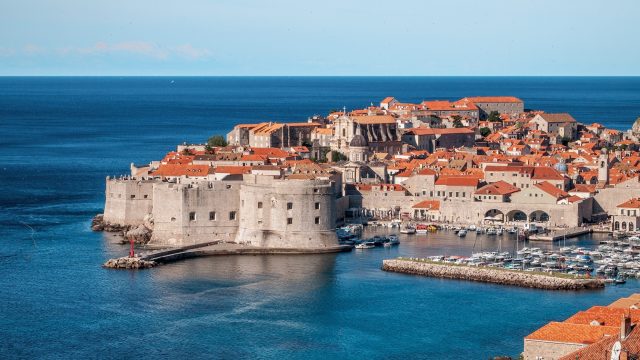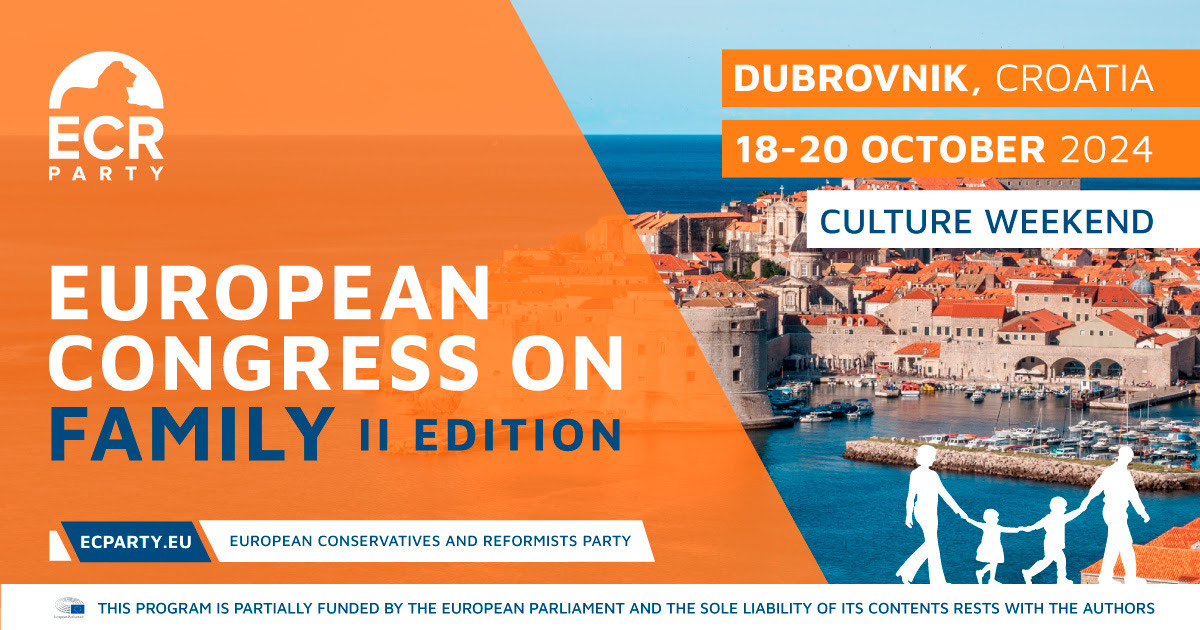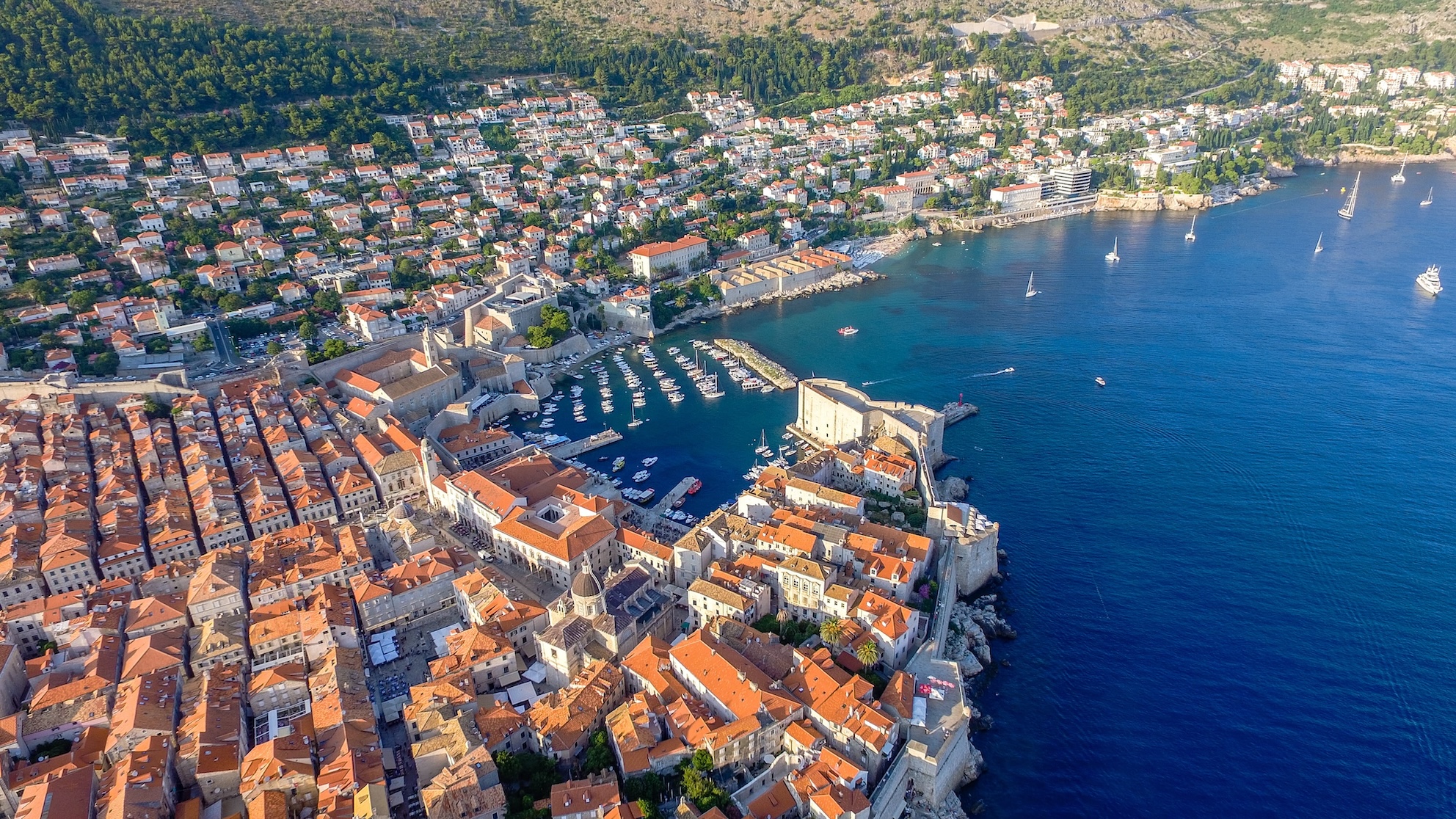
After a long politically hot summer, marked by the European Parliament elections, the ECR Party family is resuming the series of events of the European Cultural Weekend project. On October 18-20, european conservatives are expected in Dubrovnik for the second edition of the event entitled: European Congress on Family Il. The agenda of the Dubrovnik meeting is full, with panels on topical and extremely important issues for the present and future of the European Union.
The conference will start on Friday morning, October 18, and the program announced by the organizers for the first day of the event will cover three topics.
Generations in Balance: effects of aging demographic trends on the European
economy
The debates will start with a hot topic for Europe: “Generations in Balance: effects of aging demographic trends on the European economy”. It is a well-known fact that Europe is currently facing one of the biggest demographic challenges in post-World War II history: the rapid ageing of its population. This ageing trend in the European population is the combined result of a declining birth rate and increasing life expectancy, which implicitly leads to an imbalance between the younger and older generations. Looking from an economic point of view, these demographic changes have had far-reaching effects and of course an imbalance on the labour force, productivity and the sustainability of social protection systems in EU Member States. It is well known that one of the major effects of an ageing population is a shrinking active workforce. With more people from older generations retiring and fewer young people entering the labor market, many European countries are facing a shortage of workers.

The effect of this deficit has been to reduce the economy’s capacity to produce goods and services, putting pressure on productivity. On top of this, the increase in the number of pensioners is affecting public budgets. Pension and health care systems are under great pressure, as increasing budgetary allocations are needed to care for the elderly and pay pensions. The maintenance of these pension and health systems is becoming unsustainable without significant reform at EU level. As a stop-gap solution, some Member States have started to increase the retirement age and adjust social benefits for young people.
To combat the negative effects of an ageing population, it is very important that Europe adopts policies that support controlled migration and better integration of the workforce, encourage technological innovation and support the active participation of older people in the economy. Member States should also consider the adoption of measures to encourage the birth rate such as financial incentives for families. These financial incentives, which could be granted to young families, are essential to restore demographic and economic balance. This is why Europe’s ageing population can be turned by European governments into an opportunity, not just a challenge.
The family of the future: New technologies and opportunities for families
The second panel on Friday will discuss the family of the future. There is no doubt about the speed at which technology has evolved in recent years and how it is influencing all aspects of life, including the structure and dynamics of a family. In the future, families are expected to take full advantage of new technologies, which will certainly offer innovative opportunities in the areas of communication, education, health and not least in the way family members manage their time. As experts predict, one of the areas where technology will have a significant impact will be in the way family members communicate with each other. Thanks to advances in telecommunications, augmented reality (AR) and virtual reality (VR), families will be able to interact in a much more integrated way, even when they are physically separated for various reasons. These technologies will enable virtual encounters in 3D spaces, providing a near-real presence in the everyday lives of distant family members. Our children’s education will undergo a major transformation thanks to digital technologies. The plethora of personalized online platforms and artificial intelligence will give the younger generation access to an education tailored (personalized) to their needs and learning pace. In terms of family health, technology will make it easier to monitor health through smart devices and apps that can detect medical problems early. Telemedicine is expected to become a common tool in the family of the future. With telemedicine, family members will have quick access to specialists anywhere in the world, reducing the time and costs associated with medical care by traveling to hospital facilities. Another aspect that will influence the daily life of the family is household automation. Smart homes’ will reduce the time spent on domestic activities, allowing family members more free time for recreation and socializing. The family of the future will therefore be profoundly influenced by new technologies, which will certainly open up new opportunities to increase the quality of life and strengthen family ties.

The third panel of the day will bring to the audience conservative voices who, through interviews, will try to explain to those present why the future of Europe must follow the conservative path. The first day of debates will be crowned by a thematic tour of Dubrovnik, a city at the crossroads of Eurasian cultures, and in the evening a welcome cocktail reception where participants will be able to socialize in a more relaxed environment with Europe’s conservative leaders.
Saturday, dedicated entirely to the ECR Party conference, will start with a very burning theme: Conservative Education for modern times: Reintegrating optimistic patriotism and unbiased
excellence in European education.
Conservative Education for modern times: Reintegrating optimistic patriotism and unbiased
excellence in European education
In the context of today’s global challenges, with a war close to EU borders, successive waves of migrants from the Middle East, European education should benefit from an approach that blends traditional values with the demands of modern times. A conservative education, based on optimistic patriotism and impartial excellence, can contribute to the formation of responsible citizens who are aware of the multicultural and historical heritage that Europe offers us. Optimistic patriotism in education does not necessarily mean promoting aggressive nationalism, but cultivating a healthy sense of pride in the history, culture and values of EU nations. Our children should learn about their own country’s achievements and contributions within a European framework, thus fostering respect for diversity and European cohesion. Member States must emphasize skills and knowledge, regardless of social or ethnic background. This will in the most positive way nurture talent and prepare a new generation able to face the increasingly complex challenges of the times we live in. This is why it is of paramount importance to reintegrate these values into education, values through which Europe can educate a generation of responsible citizens, capable of appreciating national traditions and actively contributing to the progress of an open and dynamic society. This balance between tradition and modernity can become an important pillar in shaping the future of education in the Member States of the European Union.
Offline, Reconnecting the Family: Social media, regulating the addiction of the century
The second Saturday panel of the ECR Party conference will be dedicated to the impact of social media and social media addiction on citizens. We can say that humanity is living in a so-called digital age, where social networks have become an integral part of our lives. Although these networks make it easier to connect and exchange information, we can say that we are witnessing a new global problem: social media addiction. This trend affects not only individuals, but also families, as the time for real and quality interaction between family members has been significantly reduced. Excessive use of social platforms can therefore lead to isolation, less direct communication and neglect of family relationships. Studies carried out in recent years have shown that prolonged time spent online can negatively affect mental health, often leading to anxiety and depression. The most affected social group is young people. In this context, conscious regulation of time spent on social networks becomes necessary. The regulation, or we could call it education, of social media addiction starts at family level, by implementing clear rules on the use of technology. One of the most effective measures would be to implement periods of “disconnection”, where family members would give up these social networks and try to spend time together without digital distractions. Experts believe that these offline moments are crucial for reconnecting and strengthening interpersonal bonds among family members. Digital literacy also plays an important role in shaping balanced behavior. That is why understanding the negative impact of social media addiction and promoting a balance between the online and the real world are important steps to protect a family’s health and unity
Firm Roots, New Horizons: Conservative Family values in a changing Europe
These are times of major social and cultural change in Europe. Promoting conservative family values therefore provides a stable anchor in the face of contemporary challenges. Values such as respect for tradition, individual responsibility and family cohesion remain relevant and necessary in today’s modern context. We all know that the conservative family is based on fundamental principles: solidarity between generations, moral education and the promotion of a balanced lifestyle. In a globalizing world, these values help to maintain a sense of identity and cultural continuity. Conservative values provide a clear framework for the upbringing and education of children, emphasizing mutual respect, hard work and responsibility towards the community.
However, the European Union is in a period of change and the conservative family must adapt to new realities without losing its essence.
After the third panel, Saturday will offer participants a Boat tour, a history of the Mediterranean sea. Sunday is dedicated to a debate on the topic: Discussing the long-term mixed legacy of the Christian kingdoms and the Ottoman Empire in Europe. The debate will take place at the Rector’s Palace in Dubrovnik, which is a palace in the city of Dubrovnik that served as the seat of the Rector of the Republic of Ragusa between the 14th century and 1808. For those interested in attending the European Congress on Family Il, organized by ECR Party, registration can be done HERE.



 Subscribe
Subscribe